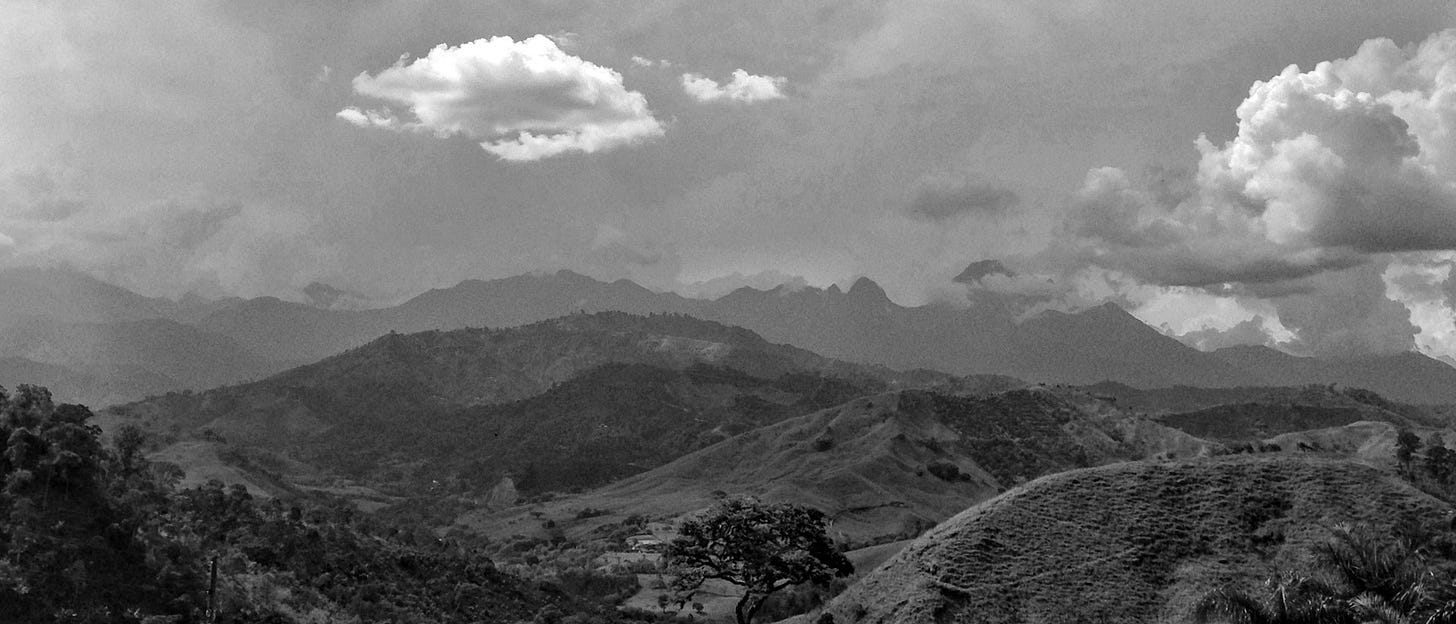Coffee News Roundup: Week Ending April 9th
A new study looks at the effect climate change will have on Colombia's coffee producers, region by region. Plus, some greenwashing nonsense from Keurig Dr Pepper, and a potential coffee pod COVID test
Welcome to another weekend and therefore another Coffee News Roundup. Although this week there isn’t a whole lot of coffee news to round up—or at least, interesting enough to warrant inclusion.
That being said, a few morsels did make their way into the news feed, so let’s take a look.
How Climate Change Affects Colombia’s Coffee Production - Via Global Coffee Report
A lot of the time, when news outlets report on the impact climate change will have (is having, in some cases) on coffee-producing countries, they talk about it using a country-wide framing. It’s going to devastate [insert country name]’s coffee industry. Coffee producers in [insert country’s name] will have to start adapting to new weather patterns.
But countries are, in general, big places, and they tend to have widely varying terrain and weather patterns depending on where you are. So yes, climate change is going to affect coffee growers in Colombia—the focus of this fascinating new study published in Agricultural Systems—but it won’t impact them all equally.
In fact, grim as it might sound, warmer temperatures could help rather than hinder some producers. “My family’s farm is about 1900 meters above sea level,” lead author Federico Ceballos-Sierra said. “Twenty years ago, people would consider that an upper marginal coffee growing area. But now we’re getting significant improvements in yield.”
Ceballos-Sierra and fellow researchers looked at climate change impacts in the country broken down into 521 coffee-producing municipalities. What they found was… not hugely surprising.
“Colombian coffee is currently growing in areas with different altitude levels, and climate impacts will likely be very different for low altitude and high-altitude regions,” said Sandy Dall’Erba from the University of Illinois, a co-author of the study.
Having analyzed historic weather and coffee yield data from all the municipalities, the team was able to model anticipated weather conditions out to 2061 and the predicted coffee production for each area. Although they estimate that productivity overall will increase by 7.6% by that time, this assumes a 16% increase in higher altitude areas but an 8.1% decrease in low altitude regions.
“Low-altitude municipalities will be negatively affected by climate change,” Ceballos-Sierra said, “and thousands of growers and their families in these areas will see their livelihood jeopardized because productivity is likely to fall below their breakeven point by mid-century.”
More Headlines
ACE And Nicaragua’s Fincas Mierisch Revive Los Favoritos Auction
Go Fund Bean Launching Bean To Bean Mentorship Program
Does The Arrival Of Costa Coffee Spell The End For Japan’s Independent Cafes?
The Week In Coffee Unionizing
A couple of weeks ago came news that the union drive at Colectivo Coffee had finally reached the voting stage, where some 300 workers at the Wisconsin-based specialty chain would decide whether to join the International Brotherhood of Electrical Workers (IBEW) Local 494.
After months of campaigning and allegations of union-busting on the part of the company, the votes have been tallied and ended in a tie: 99 votes for, 99 against.
This doesn’t mean that it’s over, however—several votes are being challenged by the IBEW and Colectivo management, meaning that it will come down to these final 16 ballots to decide whether Colectivo’s workers will become the largest unionized coffee company in the country.
According to the Milwaukee Journal Sentinel, the National Labor Relations Board will review the contested ballots in the coming weeks, which means we’ll have to wait a bit to find out the result. Stay tuned!
The Week In Corporate Coffeewashing
Did you know that Keurig Dr Pepper has strengthened its commitment to water stewardship across its value chain by joining the new Texas Water Action Collaborative? No? Well, they have!
What does this involve, you ask? According to the press release, “the group will work to invest in efforts along the Upper Trinity River that yield positive return for water quality and quantity.”
Currently, the collaborative is “surveying interested parties, developing best practices, metrics, proposals, and investment matching methodology that will create a model which can be replicated along the entirety of the Trinity River and other river systems across the state.”
So, the usual corporate sustainability nonsense.
This is the Keurig Dr Pepper (owned by JAB Holdings, of course) that has consistently scored poorly on the sustainability non-profit Ceres’ “Feeding Ourselves Thirsty” report which ranks drinks companies’ water management protocols. It also had to recall bottled water after one of its brands was found to contain high levels of arsenic. Not to mention it’s one of the companies that is trying to foist the responsibility for recycling onto the consumer, because that’s what they do.
This isn’t really about coffee, of course, although lipservice is briefly paid with the line “through 2019, the company has replenished 73 per cent of the water used for coffee and cold beverages in its highest water-risk manufacturing locations and has improved its water use efficiency by 4.4 per cent from its baseline.”
All in all, a pretty standard example of corporate greenwashing.
Is Coffee Good For You?
It could maybe be used as a test for COVID-19! Tangentially, but still. And finally, a good use for Nespresso pods.
Sprudge reports that a scientist in the Netherlands has come up with a way to utilize Nespresso pods in a low-cost testing method similar to the widely-used PCR test. The coffee, judging by the photos that accompany the original reporting, is removed from the pod before the test is carried out.
I don’t quite understand the science, even the layman’s terms that Sprudge uses, so I suggest you read the two articles linked above if you’re interested in learning more.
What To Read
Isolation And Fear Among Myanmar Coffee Producers As Military Coup Wears On by Susan Heller Evenson
The Mocha: The Surprising History Of A Delicious Coffee Drink by Liz Clayton
Until next week, drink good coffee.






